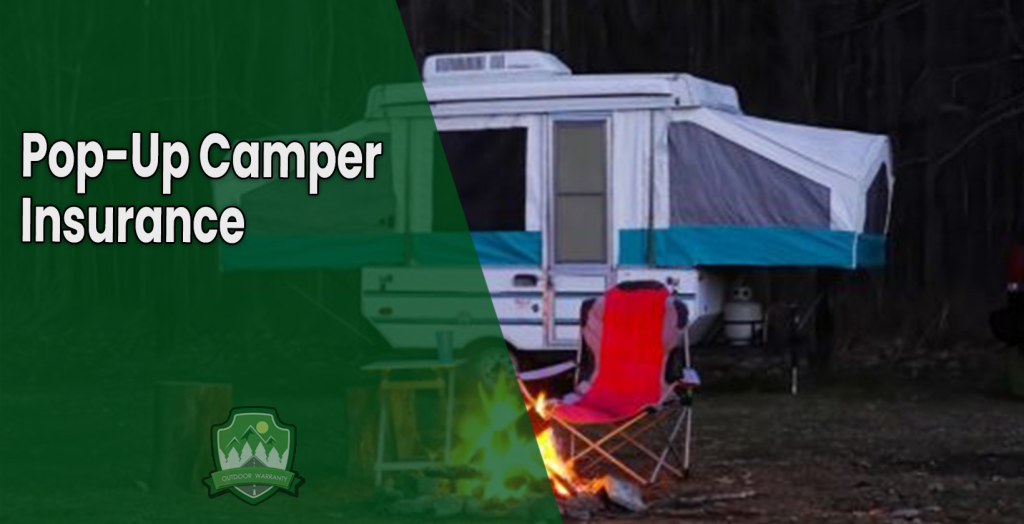
Table of Contents
Pop-up Camper Insurance (Camper Trailer Insurance) protects against theft, damage, and accidents. Pop up camper insurance costs range from $100 to $500 annually, depending on the camper’s age, value, and usage. The answer to the question ‘How much are pop-up campers?’ depends on the unit’s model, features, and age.
Insurance provides financial protection, covering repairs, replacements, and liability risks. It offers peace of mind during travel and storage, safeguarding upgrades like air conditioning. Pop-up campers are cheaper to insure than other RVs due to their smaller size and fewer features.
The camper’s lifespan and maintenance affect insurance costs. Well-maintained campers tend to have lower premiums. Understanding the camper’s classification, such as folding trailers or hybrid models, helps determine the appropriate camper trailer insurance needed for adequate coverage.
Do Pop-Up Campers Need Insurance?
Yes, pop-up campers need insurance. Insurance is not legally required, but it is recommended. Financing a pop-up camper involves insurance. Insurance protects against damage while traveling on the road. Accidents or thefts make insurance essential. States have specific requirements for insurance coverage. Roadside assistance and liability coverage are commonly included. Repair costs and damages become expensive without insurance.

How does Pop-Up Camper Insurance Work?
Pop Up Camper Insurance works by covering damage, theft, or loss of the camper during travel. Insurance includes liability, collision, and comprehensive coverage options. Liability covers damage caused to other vehicles or property. Collision covers damage to the camper from accidents. Comprehensive insurance covers non-collision incidents, such as theft or natural disasters.
Pop-up camper insurance is less expensive compared to RVs or motorhomes. RVs and motorhomes require more extensive coverage due to their size and additional amenities. Insurance for RVs includes more options for interior damage, personal belongings, and extended roadside assistance. Pop-up campers are simpler and smaller, usually with fewer coverage needs. However, the types of insurance offer similar protection when it comes to accidents, theft, and liability.
Can I Insure a Used Pop-up Camper?
Yes, you can insure a used pop-up camper. Insurance companies cover new and used campers. The types of coverage available for used pop-up campers include liability, collision, and comprehensive coverage. These policies protect against damage, theft, or accidents. The coverage for a used camper is similar to that of a new one, though the value of the camper affects the premiums. Used pop-up campers have lower insurance costs than new ones due to depreciation.
What are the Costs of Pop-Up Camper Insurance?
The Costs of Pop-Up Camper Insurance are between $100 and $500 per year. The cost depends on the camper’s type, age, and usage. Newer campers cost more to insure than older models due to their higher value. The frequency and location of camper use affect the cost. Campers used for long road trips or in areas prone to accidents or natural disasters have higher premiums.
The choice of insurance provider plays a significant role in determining the cost. Different providers offer varying coverage options, premiums, and discounts. Outdoor Warranty provides specialized coverage for campers, including extended warranties and protection plans. These plans affect the cost of insuring a pop-up camper, with added options for specific needs, such as roadside assistance and accident coverage.
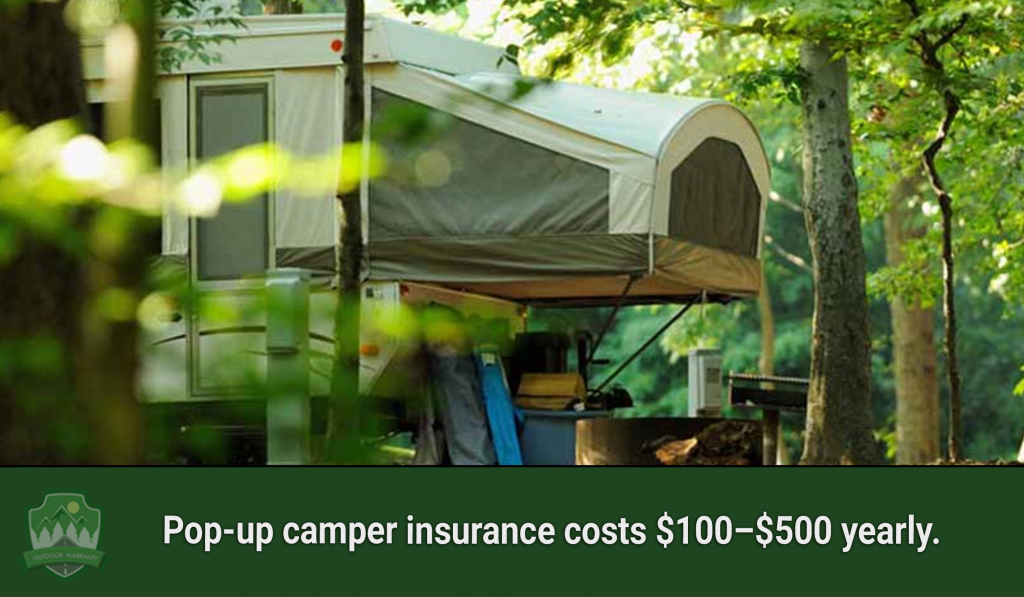
How much is the Insurance for a Used Pop Up Camper?
The Insurance for a Used Pop-Up Camper cost ranges from $100 to $300 per year. The premium is lower compared to new campers due to depreciation and the reduced value of the camper. The cost varies depending on the camper’s age, condition, and usage. For example, a well-maintained used camper cost more to insure than an older, less cared-for model.
State laws and required coverage levels determine the cost of insurance. States have minimum liability requirements, which influence the policy’s premium. The more extensive the coverage, such as comprehensive or collision coverage, the higher the cost. Basic liability coverage is cheaper but does not provide adequate protection in the event of an accident or damage. Upgrades or additional protection, such as an extended RV Warranty Cost, impact the cost of insurance. Add-ons like roadside assistance or protection for custom features increase premiums but provide extra security and peace of mind.
Is Insurance for Pop-Up Campers Required by Law?
No, insurance for pop-up campers is not required by law in all situations. RV Regulations and Compliance vary based on location and whether the camper is towed or driven. States require insurance if the pop-up camper is used for towing, while others do not have mandatory insurance laws for campers.
However, liability insurance is required to cover damages to other vehicles or property if the camper is towed and involved in an accident. Insurance is mandatory in cases where the pop-up camper is being used on the road for extended periods or in areas with specific RV Regulations and Compliance. Check local laws to ensure compliance.
What Factors Affect the Cost of Pop Up Camper Insurance?
The Factors Affect the Cost of Pop Up Camper Insurance are listed below.
- Camper Value: The higher the camper value, the higher the insurance premiums. Newer or more expensive models cost more to insure.
- Camper Age: Older campers have lower insurance costs due to depreciation. However, vintage or rare models increase premiums.
- Location: Insurance costs vary depending on where the camper is used. Areas prone to natural disasters, high accident rates, or theft lead to higher premiums.
- Frequency of Use: The more frequently the camper is used, the higher the insurance cost. Full-time use or long road trips result in higher premiums.
- Driver History: Drivers with a clean driving record pay lower premiums. Drivers with past accidents or traffic violations face higher rates.
- Custom Features: Upgrades like air conditioning, customizations, or high-end additions increase the camper’s value and, therefore, the insurance cost. Custom features that add to the RV Type value require additional coverage, raising premiums.

Why Choose a Pop up Camper than a Travel Trailer?
Choose a Pop-up Camper than a Travel Trailer because of its affordability, ease of use, and compact design. Pop-up campers are lighter and smaller, making them easier to tow and maneuver than a larger Travel Trailer. Their foldable design allows for a more manageable storage size, which is a significant advantage if owners have limited space for parking.
Cost considerations are another key factor. Pop-up campers are more budget-friendly than Travel Trailer models in terms of initial cost and ongoing expenses. The insurance costs for a pop-up camper are lower due to its smaller size and simpler design. Travel Trailer insurance tends to be more expensive due to the larger size, additional features, and greater value of the trailer.
Pop-up campers require less maintenance, making them a more economical option in the long run. Their simplicity means fewer systems that need repairs or replacements. The lower price tag and insurance premiums appeal to owners seeking a more cost-effective camping solution.
What are the Benefits of Insuring a Pop-Up Camper?
The Benefits of Insuring a Pop Up Camper are listed below.
- Financial Protection Against Accidents: Insurance covers damage to the camper in the event of an accident, reducing out-of-pocket expenses for repairs or replacements.
- Protection Against Theft: Insurance reimburses the owner for its value if the camper is stolen, reducing financial loss.
- Coverage for Natural Disasters: Insurance protects the camper from damage caused by storms, floods, or fires, ensuring repairs or replacements are covered.
- Peace of Mind During Travel: Owners confidently travel, knowing their camper is protected from unexpected accidents or damage.
- Peace of Mind During Storage: Insurance covers the camper while in storage, protecting it from theft, vandalism, or damage while not in use.
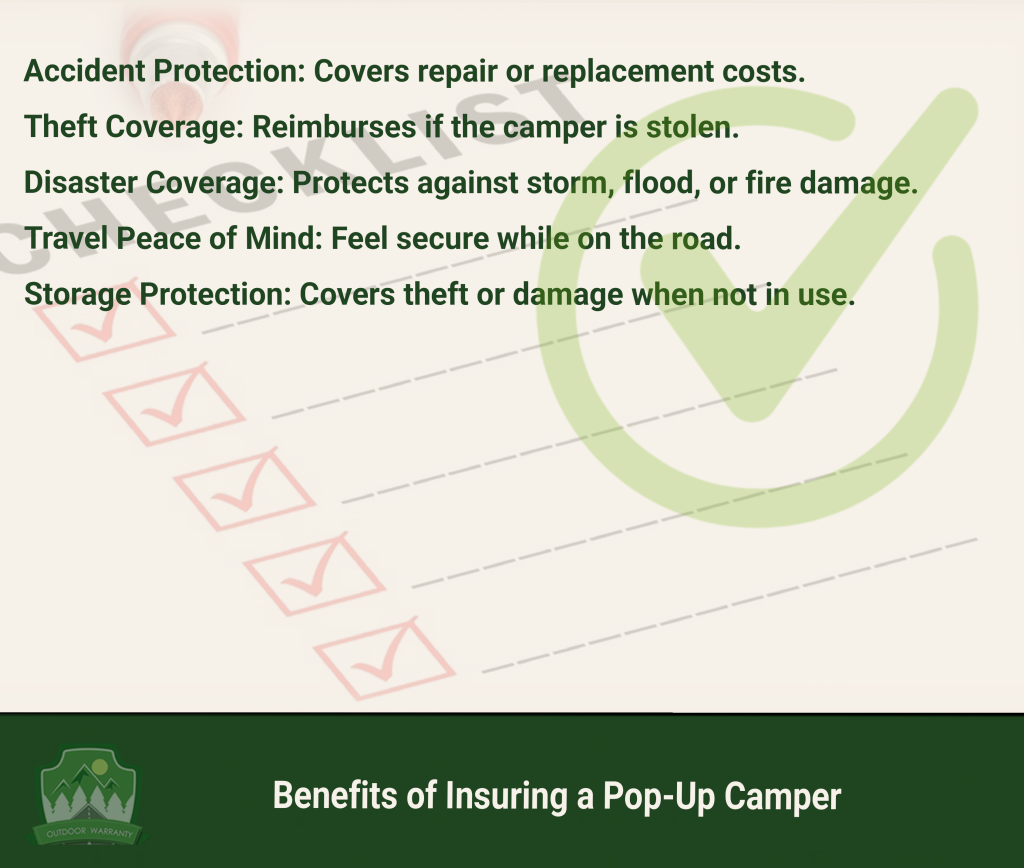
What Coverage Options are Available for Pop-Up Camper Insurance?
The Coverage Options Available for Pop Up Camper Insurance are designed to protect against various risks. The primary types of coverage include liability, collision, comprehensive, and roadside assistance.
Liability coverage protects against damage caused to other people’s property or injuries in an accident. Collision coverage covers damage to the camper in the event of a collision, regardless of fault. Comprehensive coverage protects against non-collision incidents like theft, vandalism, or natural disasters. Roadside assistance provides support in case of a breakdown, offering services like towing, flat tire repairs, and battery jump-starts.
Optional add-ons for pop-up camper insurance include personal effects coverage, which protects belongings inside the camper, and towing coverage, which covers the cost of towing the camper in case of a breakdown or accident. These add-ons allow owners to customize their policies to fit their specific needs.
Can Pop Up Camper Insurance Include Protection for Air Conditioning Units?
Yes, pop-up camper insurance can include protection for air conditioning units. However, standard policies do not cover air conditioning units and require additional coverage or an add-on.
Ensure valuable upgrades like air conditioning help protect against potential damage or theft. RV Technology, like air conditioners, is expensive to repair or replace, making coverage for these features beneficial. Owners have to pay out-of-pocket for repairs without specific coverage. Adding coverage for air conditioning units ensures that these valuable upgrades are properly protected.
How to Choose the Best Pop Up Camper Insurance Policy?
To Choose the Best Pop Up Camper Insurance Policy, follow the five steps listed below.
- Compare Costs. Start by obtaining quotes from multiple insurance providers. Look at the premiums offered and ensure the cost fits within the budget. Do not choose the cheapest option if it sacrifices necessary coverage.
- Examine Coverage Options. Review the types of coverage included in each policy, such as liability, collision, comprehensive, and roadside assistance. Ensure the policy provides adequate protection for the camper and its upgrades.
- Check Customer Reviews. Research customer reviews to understand the provider’s reputation. Look for feedback on claim processing, customer service, and satisfaction. A good provider must have positive reviews and a reliable track record.
- Prioritize Reputable Providers. Choose well-established insurance companies with a good reputation. Research their financial stability to ensure they handle claims efficiently when needed.
- Look for Customizable Plans. Choose a policy that allows flexibility in coverage options. A customizable plan enables owners to adjust their policy as needed, such as adding coverage for air conditioning or other upgrades. It ensures owners get the protection best suited to their specific needs.
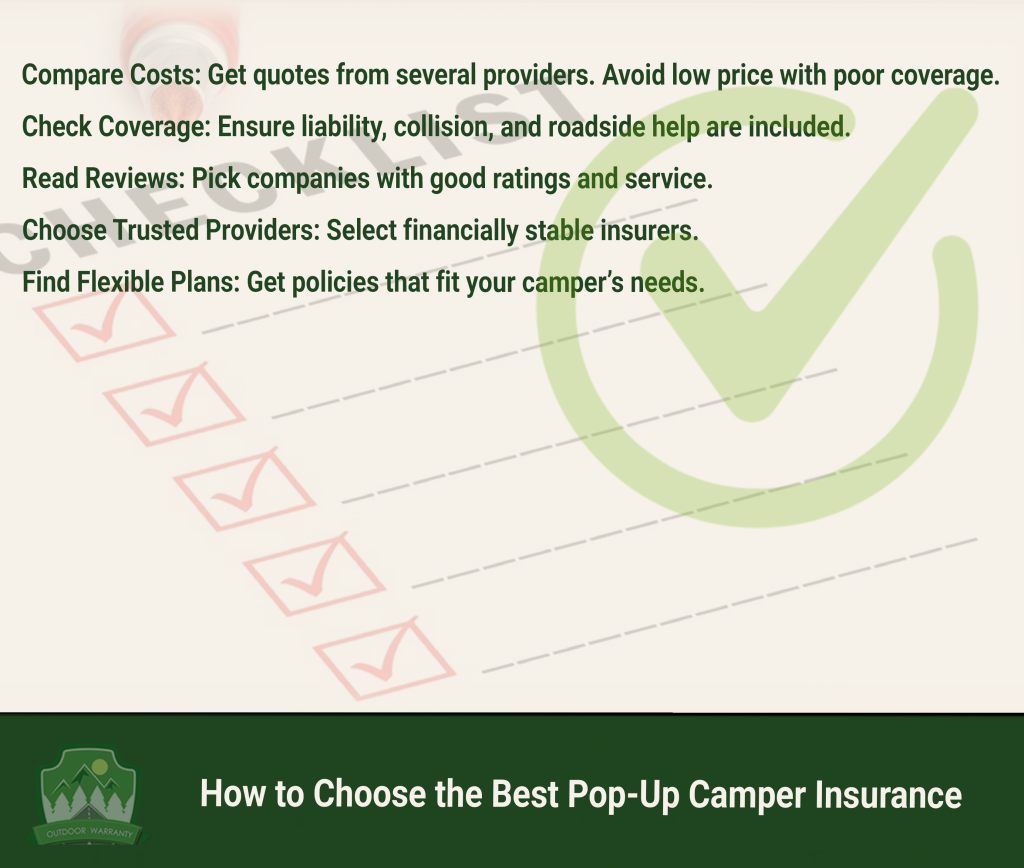
Are Pop Up Campers Allowed in National Parks without Insurance?
No, insurance is not required for entry into national parks with a pop-up camper. However, liability insurance is recommended, although it is not mandatory for entry. National parks do not enforce insurance requirements, but visiting such parks involves risks like accidents or damage to park property. Liability coverage helps protect against these risks. Have comprehensive or collision coverage to protect the camper in case of an incident. Having the right insurance gives peace of mind while enjoying outdoor activities and ensures owners are covered if an accident or damage occurs within park grounds.
Does a Pop-Up Camper Require Additional Insurance if it’s Air-Conditioned?
No, a pop-up camper does not require additional insurance if it’s air-conditioned. However, upgrades like air conditioning impact the policy premiums. Air conditioning units are valuable additions, and insurance premiums increase to cover the potential repair or replacement costs. These upgrades are not automatically covered under a standard policy and require an add-on or increased coverage. Insuring valuable add-ons ensures that features like air conditioning are protected from damage, theft, or malfunction, preventing additional out-of-pocket expenses.
How does Pop Up Camper Insurance Compare to other RV Insurance Costs?
Pop Up Camper Insurance is less expensive compared to other RV insurance costs. The average price for pop-up camper insurance ranges from $100 to $500 per year, depending on factors like camper value, location, and usage. Insurance for travel trailers costs between $200 and $600 annually. Motorhome insurance is the most expensive, ranging from $500 to $1,500 annually.
The differences in insurance costs are due to the size, features, and usage of each type of RV. Pop-up campers are smaller and simpler, with fewer amenities and lower market value, resulting in lower premiums. Travel trailers are more complex and have more features, increasing insurance costs. Motorhomes are the largest and most equipped, with built-in living spaces and additional technology, making them the most expensive to insure. The frequency of use and the areas where these RVs are driven impact the insurance cost.
What to know about Insurance for Used Pop Up Campers?
The things to know about insurance for used pop-up campers are the factors that affect the cost and coverage. Depreciation plays a major role in determining premiums for older campers. Its market value decreases, which results in lower insurance premiums as the camper ages. However, it results in higher premiums if the camper has been in prior accidents or has previous claims, even with the decrease in value.
The age of the camper impacts coverage. Older campers are not worth as much as new ones, so the coverage is limited to actual cash value rather than replacement cost. Ensure the policy reflects the current value of the camper, considering wear and tear.
Compare quotes from different insurance providers to find affordable coverage for older models. Look for companies that offer discounts for safe driving, low mileage, or storing the camper during off-seasons. Check the potential resale value of the camper for owners involved in RV Selling, as it impacts the amount of coverage needed. Adjusting the coverage limits based on the camper’s value helps avoid overpaying for insurance while protecting against significant loss.
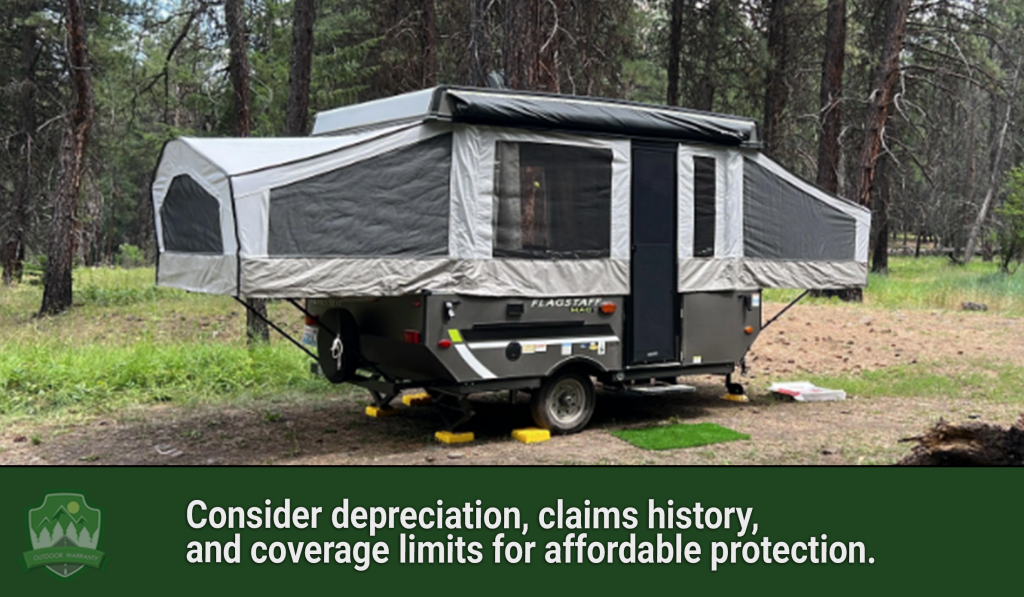
Is Pop Up Camper Insurance Necessary for Winter Storage?
Yes, pop-up camper insurance is necessary for winter storage. Maintaining insurance during storage protects against theft, weather damage, and liability while the camper is not in use.
Insurance ensures that the camper is covered in case of damage from winter storms, vandalism, or other incidents. Having insurance helps recover the loss or repair the damage if the camper is stolen or suffers weather-related damage while in storage. Liability coverage protects against any damage the camper causes to other property while in storage.
Seasonal coverage options are available, allowing owners to adjust their policy for the off-season. These options lower premiums during the winter months while offering protection for risks like theft or severe weather damage.
How long does a Pop up Camper Lasts?
A pop-up camper lasts between 10 to 15 years on average, depending on maintenance and usage. Regular upkeep extends its lifespan by checking for leaks, cleaning, and servicing the camper. Well-maintained pop-up campers last over 15 years, with some models reaching 20 years.
The materials used in construction, such as the canvas, frame, and suspension system, impact the camper’s longevity. The canvas fabric degrades if exposed to harsh weather conditions or improper maintenance. Frames from durable materials like aluminum or steel last longer than frames made from weaker materials. Proper storage during the off-season and avoiding excessive wear further prolong the camper’s life.
Frequent use or exposure to harsh environments like extreme temperatures or rough terrains shorten the lifespan of a pop-up camper. However, a pop-up camper provides years of reliable use for camping adventures with the proper care and attention.
Do Pop Up Trailers have Different Insurance Requirements?
Yes, pop-up trailers have different insurance requirements compared to motorized RVs. Towable pop-up campers have less complex insurance needs than motorized RVs.
The main difference lies in the coverage for the towing vehicle. The towing vehicle’s insurance covers the camper while it is being towed for pop-up trailers, while motorized RVs require full insurance for the vehicle and the living space. Fifth Wheel Extended Warranty and similar add-ons are specific to larger RVs and do not apply to smaller towable pop-up trailers.
Factors like camper’s usage frequency and the type of towing vehicle impact coverage. Insurance costs increase with more frequent and longer travel distances. Have liability coverage in case of accidents while towing for pop-up trailers, while motorized RVs will need broader protection that covers both the vehicle and the living area.
Is a Pop Up Camper considered a Travel Trailer?
No, a pop-up camper is not considered a travel trailer. There are key differences between the two, while both are towable campers. A pop-up camper (folding camper or tent trailer) is designed with collapsible sides that expand to create sleeping and living spaces. Travel trailers are fully enclosed and rigid, offering more space and amenities. Pop-up campers are lighter and more compact than travel trailers, making them easier to tow but with fewer features.
Pop-up campers require trailer tent insurance, which differs from the insurance for more robust travel trailers. Trailer tent insurance protects the camper’s structure, contents, and liability while in use. Travel trailers require broader coverage due to their increased value and features.